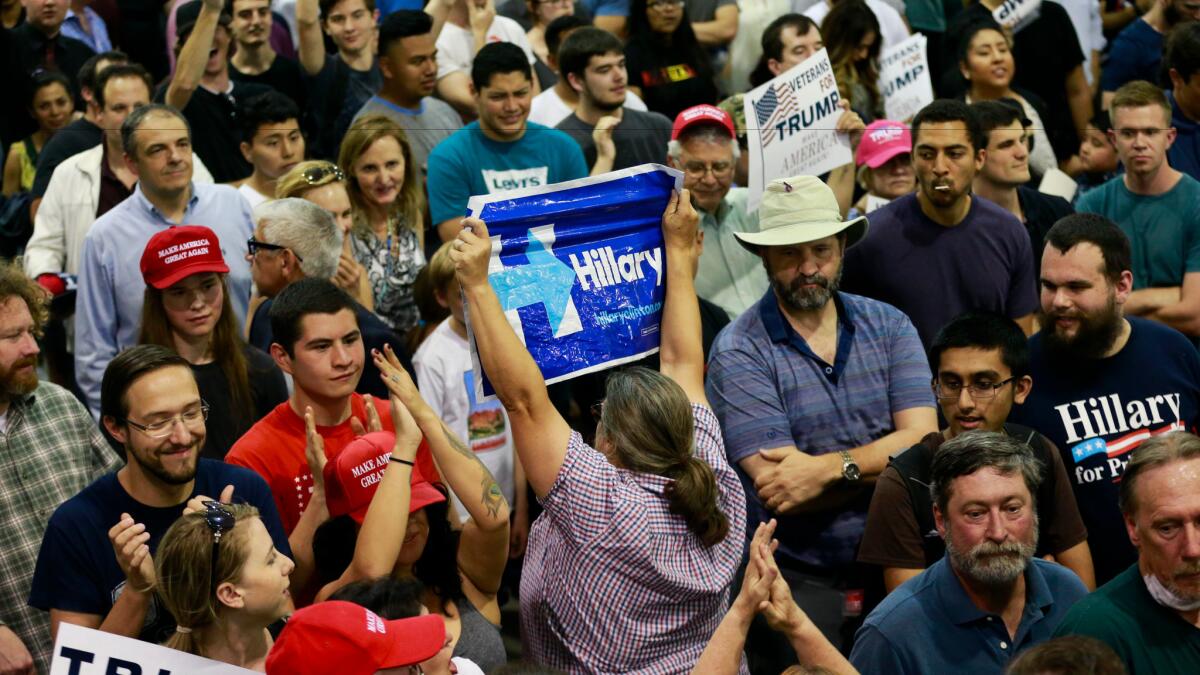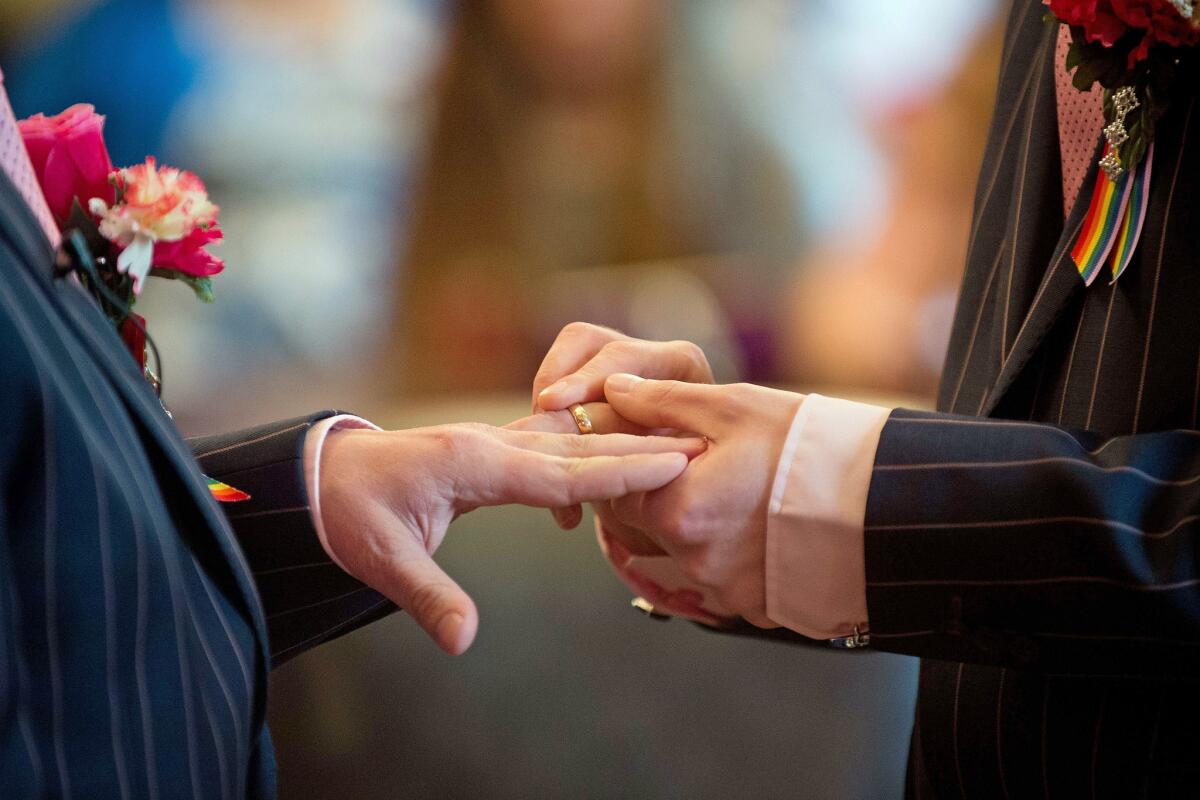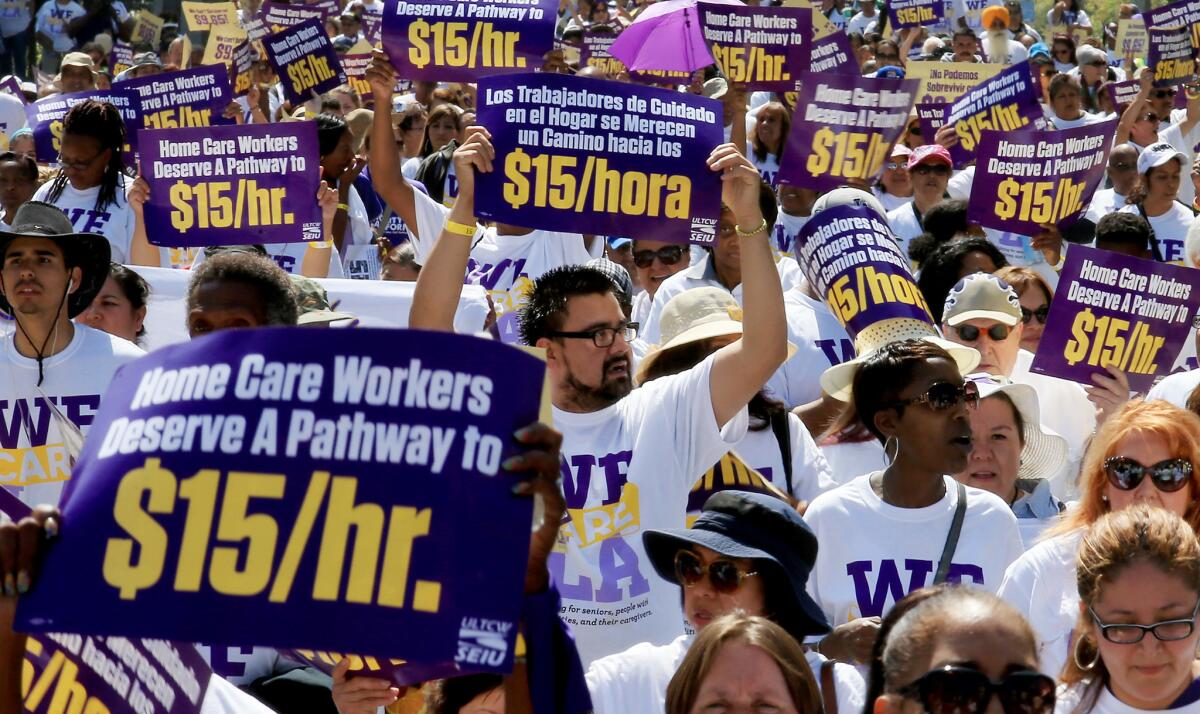How the Democratic and Republican party platforms stack up on climate change, Iran and more key issues

- Share via
The party platforms of Democrats and Republicans, finalized ahead of their respective conventions this month, reflect the stark divide between the parties, on both foreign affairs and domestic social issues.
Here’s a rundown of where the parties land on key topics:
Climate change
Democrats describe climate change as a “real and urgent threat,” and they call for setting a price on greenhouse gas emissions. “Climate change is too important to wait for climate deniers and defeatists in Congress to start listening to science,” and government officials must take any steps they can to reduce pollution, the platform says. It calls for the country to generate half of its electricity from clean sources in the next decade and for cleaner transportation fuels, more public transit and a tax code that creates incentives for renewable energy.
The platform also beats back suggestions that protecting the environment would be bad for business. “Democrats reject the notion that we have to choose between protecting our planet and creating good-paying jobs,” it says.
Republicans say “climate change is far from this nation’s most pressing national security issue,” as Democrats have labeled it. They oppose international accords like the agreement crafted in Paris last year that aims to reduce greenhouse gas emissions to slow the climb in global temperatures.
The platform also blasts President Obama’s “clean power plan,” which would cut emissions by shifting away from coal-powered power plants. The initiative has been put on hold by the Supreme Court; Republicans vow to do away with it entirely. They also pointedly describe coal as a “clean” energy resource, a description environmentalists have roundly rejected.
Environmental problems are best solved with “incentives for human ingenuity … not through top-down, command-and-control regulations,” the platform says.
Iran
Democrats support the nuclear agreement between Iran and six world powers, including the U.S., “if vigorously enforced and implemented.” They also say the country should “not hesitate to take military action if Iran violates the agreement.”
The deal, struck last year, aims to curtail Iran’s nuclear capability in exchange for lifting debilitating economic sanctions.
Republicans have staunchly opposed the accord as dangerously enabling a longtime adversary; a GOP-led effort to block the deal in Congress failed last fall.
The GOP platform rejects the Iran nuclear deal and states flatly, “A Republican president will not be bound by it.” The party vows to “retain all options” in dealing with Iran.

Islamic State
Democrats call for congressional authorization of military action “that does not involve large-scale combat deployment of American troops”; their vice presidential candidate, Virginia Sen. Tim Kaine, has been a leading proponent for new legislation to govern combat operations against Islamic State. The Obama administration is operating under authority granted by Congress after the Sept. 11 attacks to use the military against “international terrorism.” Its own updated proposal last year languished in Congress.
The platform also rejects "Donald Trump's vilification of Muslims," saying it "feeds into ISIS' nefarious narrative." Among Trump’s most divisive proposals has been his call for a temporary ban on Muslims trying to enter the U.S.
Republicans call Islamic State a form of "murderous fanaticism" and support continued partnership with Iraqis to eradicate the terrorist group from the region, where it holds significant territory both in Iraq and neighboring Syria. In addition to “pushing back its fighters,” the GOP calls for aiding victims of Islamic State. They support creating a safe haven in northern Iraq to protect ethnic and religious minorities targeted by the group.
Gay rights
Democrats “applaud” the Supreme Court decision last summer allowing Americans to “marry the person they love.” They call for more steps to fight discrimination against LGBT people, including new federal laws. “LGBT kids continue to be bullied at school, restaurants can refuse to serve transgender people, and same-sex couples are at risk of being evicted from their homes,” the platform says. “That is unacceptable and must change.”

Republicans denounce the court's marriage decision. Their platform supports so-called religious liberty laws that allow businesses the right to refuse services that violate their faith, such as baking a cake for a same-sex wedding. It also says efforts to allow transgender people to use bathrooms that conform with their gender identity, instead of biological sex, are “illegal, dangerous and [ignorant of] privacy issues.”
At the GOP convention, there were some olive branches extended to gays and lesbians. Silicon Valley magnate Peter Thiel got cheers when he announced in a speech that he was proud to be gay. Trump himself acknowledged LGBT victims of terrorist violence and noted approvingly when the audience responded positively.
Healthcare
Democrats believe “healthcare is a right, not a privilege,” and they support Obama’s Affordable Care Act. They vow to “keep fighting” to ensure more states expand government coverage for low-income people.
New steps are urged to reduce costs, and they want to make government-run insurance like Medicare available to more people. “For too many of us, healthcare costs are still too high, even for those with insurance,” the platform says. “And medical debt is a problem for far too many working families.”
Republicans vow to repeal the Affordable Care Act. Congressional Republican have held dozens of unsuccessful votes to roll back the legislation.
In its place, they want to “simplify the system” to increase healthcare options and reduce costs. The platform calls for allowing consumers to shop for insurance across state lines. It promotes modernizing Medicare and transforming Medicaid into a block grant program that gives states flexibility in how the money is spent.
Abortion
Democrats want to protect access to “safe and legal abortion,” and their platform says “every woman should have access to quality reproductive healthcare services.”
Hillary Clinton, who once said abortion should be “safe, legal and rare,” has emphasized her defense of abortion rights in her campaign. For the first time, Democrats are including in their platform the controversial goal of overturning the Hyde Amendment, which has been implemented since 1976 to ban the use of federal money for abortion. In addition, the platform says “we will continue to stand up to Republican efforts to defund Planned Parenthood health centers.”
The Republican platform is unambiguously antiabortion in all cases. It seeks to stop the collection of fetal issue, which is used in medical research, and calls for defunding Planned Parenthood. The GOP also supports codifying the Hyde Amendment.
The strong antiabortion stance of the platform departs from the views of the GOP nominee. Trump, who describes himself as antiabortion after previously supporting abortion rights, said he backs blocking access to the procedure except in cases of rape, incest or when a mother's life is at risk. The Republican platform does not include such exceptions.
Trump has also staked out a softer stance on Planned Parenthood. He has said the care provider has “done good things” in offering other services to women, such as mammograms. He still supports de-funding the organization because it provides abortions.

Minimum wage
Democrats want to raise the federal minimum wage to $15 an hour and index it with inflation.
The federal minimum wage is $7.25 an hour. The push for a higher wage has taken off in liberal-leaning cities and states, including in California and New York as well as Seattle.
Republicans say minimum wage is “an issue that should be handled on the state and local level.”
Follow @melmason on Twitter.
In a shift, Republican platform doesn't call for arming Ukraine against Russia, spurring outrage
Why the Republican and Democratic platforms are as consequential as they are unwieldy and arcane
Get the L.A. Times Politics newsletter
Deeply reported insights into legislation, politics and policy from Sacramento, Washington and beyond. In your inbox twice per week.
You may occasionally receive promotional content from the Los Angeles Times.








